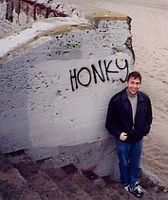Conversation with an editor...
So, while I was in Tucson, I had lunch with the editor who supervised me during my Dow Jones internship. Since I left, the Arizona Daily Star (the paper I worked at) was sold to Lee Enterprise (it was formerly owned by Pulitzer Inc.). One professor summed up Lee: It's not the evil empire, like Gannett.
Anyway, the editor's son is now in college and looking at a career in journalism. The editor, let's call him 'George', expressed some reservations about this. Primarily, he was worried about his son's ability to make a sustainable living in this career.
It's not unusual for a parent to express some concern when their son or daughter wants to persue the same career of their mother or father. After all, the parent has seen the ugly side of their career and with few exceptions, most people have a 'backup' career they sometimes wish they could have pursued. This one doctor I worked with said he wished he would have opened a record store instead of putting up with the politics of his profession (take note, he said this before having three girls). George is looking at probably another ten years of editing before retiring. However, his son is looking at a career that must sustain him for another 40 to 50 years.
For all I know, there may be no newspapers in 40 or 50 years. Still, I don't see books going anywhere. And no matter how many .PDAs, laptops and Internet cafes spring up, none of these technologies can duplicate the readability of a newspaper (no scrolling or monitor glare). And even the most cynical and obsessive sci-fi-dystopia-worshipping reader out there has to relent that people will demand 'news' in the future. If anything, people will demand news because of their own self-interest: to tell them when a hurricane is coming, to tell them how the stock market is doing and to tell them what they need to buy to remain cool. And there are always elections.
Perhaps the biggest safety net newspapers have is the further limitations of government. Libertarians (sometimes too idealistically) say that government doesn't need to tell companies to stop polluting the air, give their employees better insurance or increase fuel efficiency. They believe companies will respond to these demands if public outrage reaches a certain point. They may have a point - this week Wal Mart said it is taking measures to be more environmentally conscious (but isn't the outrage at Wal Mart aimed more at their poor treatment of their workers and not because of their environmental track record?). So, if the government is no longer a watchdog for these companies, who assumes that watchdog role? The media.
In the next 50 or 60 years, I don't see any other outlet that can reach a mass audience and mobilize people to demand companies change their way than the media. What about Bloggers? Well, with the exception of word of mouth, you usually need a media source to tell you to check out a blog. That's how most people found out about The Huffington Post. For George's son, the market and the industry will be radically different than the world that George saw. But George can rest easy ... a market and demand will continue to exist. Just don't expect George jr. to make a ton of cash from the field.
Speaking of which...
While helping with the cleanup for Hurricane Katrina, my ex-roommate and National Guard member was told he no longer had at the Birmingham Post-Herald because the paper folded. After a few tense weeks and a few interviews, he is now working as a police reporter at The Clarion-Ledger in Jackson, Miss.
Listening selections:
Magnetic Fields - 69 Love Songs
Lucinda Williams - Live @ the Fillmore
Built to Spill - Keep it Like a Secret






